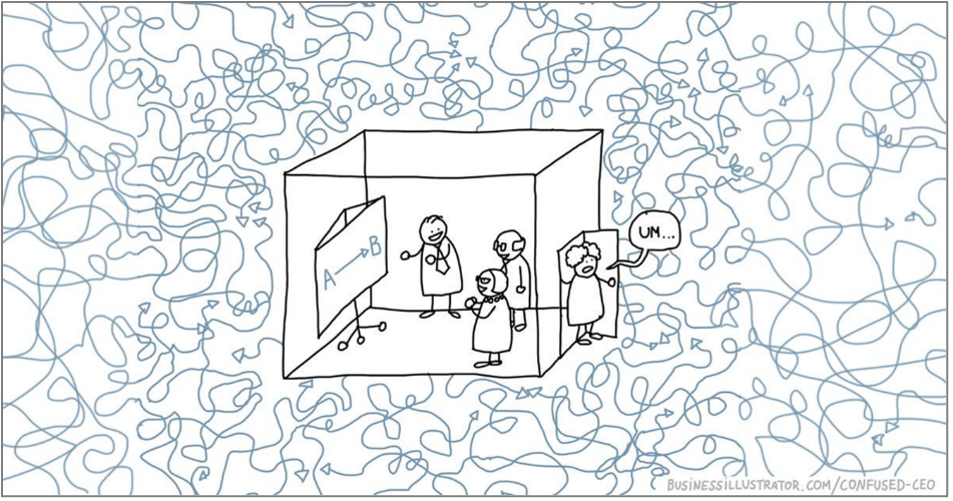The limits of ‘clockwork’ approaches to ‘cloudwork’ challenges
UNDP launches Collaboration Labs to address complex challenges
March 25, 2024

“How can we work more systemically to accelerate progress towards a more sustainable food system?” was the question at the heart of a three-year co-inquiry, convened by UNDP, that included more than 150 international development practitioners. The co-inquiry identified that development programmes often tend to take expert-led, pre-planned and linear approaches that are typically ineffective in addressing complex, systemic challenges. To be more effective, we need to collaborate across disciplines and across institutional boundaries to navigate complexity and uncertainty together through continual cycles of action, learning and adaptation. On the back of the learnings from the co-inquiry, UNDP and a number of partners are launching a series of Labs to strengthen collaboration at country and global levels.
The philosopher Karl Popper said that most problems fall into two distinct types: clock problems and cloud problems. A clock may be complicated and have multiple parts, but ultimately it can be understood through logic and can be fixed. Systemic challenges, by contrast, are “cloud” issues: constantly changing, unpredictable and impossible to control. [1]

The challenges of our global food and agriculture systems are cloud challenges: immensely complex, multi-dimensional and ever changing. A multiplicity of constantly interacting factors influence how and when change happens.
“This implies that we need to move beyond rational engineering approaches to system change and look for approaches that anticipate and accommodate inherent social tensions and struggles in processes of changing food system dynamics and outcomes” said Cees Leeuwis of Wageningen University.[1]
What would “cloudwork” rather than “clockwork” require of us? Key recommendations from the co-inquiry included:
- Acknowledging complexity: recognising the dynamic, multi-dimensional nature of the issues and being humble in holding hypotheses around how change might happen.
- Facilitating collaboration through participatory processes: recognising the fundamentally political nature of change and that change depends on navigating differences and working towards a mutually acceptable future.
- Learning through doing: putting learning at the heart of change processes, so that hypotheses are constantly being tested and revised as we learn from real world application.
UNDP’s latest report "Navigating Complexity in Food Systems: from Clockwork to Cloudwork" gives a comprehensive account of the changes that donors and international development organisations can make to navigate complexity (“cloudwork”) more effectively. The recommendations include changes to programme design and delivery, as well as wider organisational changes that are required to address institutional barriers to more collaborative and systemic ways of working.
“We must acknowledge the multi-dimensional nature of the challenges and move away from silver bullet solutions.”says UNDP’s Global Head of Food and Agricultural Commodity Systems (FACS), Andrew Bovarnick.

UNDP is convening a coalition of partners (currently including FAO, UNEP, Wageningen Centre for Development Innovation, UN System Staff College) to launch ‘Collaboration for Complex Challenges’ labs (C3 Labs). These Labs will be convened at both country and global levels. Each Lab will focus on a specific environmental challenge (in the first phase, the focus is on the food-biodiversity-climate nexus) and bring together a cohort of leaders from across different organisations to:
- Build leadership capacity for working more collaboratively and more systemically
- Build trust and relationships between participants as the foundation for greater collaboration
- Develop and strengthen collaborations between different institutions and programmes working on related issues
- Incubate new systems change initiatives that integrate collaborative approaches from the outset
- Catalyse organisational and wider systemic change by addressing institutional barriers and disincentives to collaboration and strengthening the enabling environment
If you want to find out more or would like to partner with UNDP in this collective endeavour, please get in touch with charles.omalley@undp.org.
[1] Leeuwis, C., Boogaard, B.K. & Atta-Krah, K. How food systems change (or not): governance implications for system transformation processes. Food Sec. 13, 761–780 (2021).
[2] The ‘clock’ and ‘cloud’ metaphors are drawn from Rob Ricigliano, Systems and Complexity Coach at The Omidyar Group, in his article The Complexity Spectrum.

 Locations
Locations



